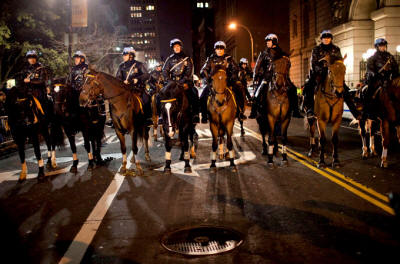|
from AlJazeera Website
the U.S. has spent about $635bn to militarize the country's local police forces
[GALLO/GETTY]
New Haven, CT
The luxury rail car company reacted by slashing workers' wages and increasing their work load. After negotiations with ownership broke down the following year, the American Railway Union, in solidarity with Pullman factory workers, launched a boycott that eventually shut down railroads across the U.S..
It was a full-scale insurrection, as the late historian Howard Zinn put it, that soon,
The U.S. Attorney General won a court order to stop the strike, but the union and its leader, Eugene V. Debs, refused to quit.
President Grover Cleveland, over the objections of Illinois' governor, ordered federal troops to Chicago under the pretense of maintaining public safety. Soldiers fired their bayoneted rifles into the crowd of 5,000, killing 13 strike sympathizers.
Seven hundred, including Debs, were arrested. Debs wasn't a socialist before the strike, but he was after.
The event radicalized him.
I imagine a similar revelation for the tens of thousands of Americans who participated in last fall's Occupy Wall Street protests. As you know, the movement began in New York City and spread quickly, inspiring activists in the biggest cities and the smallest hamlets.
Outraged by the broken promise of the U.S. and
inspired by democratic revolts of Egypt and Tunisia, they assembled to
protest economic injustice and corrupt corporate power in Washington.
Protesters met with police wearing body armor, face shields, helmets and batons; police legally undermined Americans' right to assemble freely with "non-lethal" weaponry like tear gas, rubber bullets and sonic grenades.
There was no need for the president to call in
the army. An army, as Mayor Bloomberg
quipped, was already there.
One view of freedom minimizes the state's role
in an individual's life and maximizes markets so that individuals are free
to risk whatever they want to risk to be whatever they want to be. Another
view sees the obligation of the state to hedge against the risk of the
marketplace so that individuals can feel secure enough to be what they want
to be.
Moreover, income for the 99 per cent grew by 20 per cent from 1993-2000, but during the Bush years, it grew by only 6.8 per cent.
It's worth saying again that this is not a natural occurrence of the free and open marketplace. The upward redistribution of wealth is the concrete result of politics and policy - one might even say socialism for the rich, capitalism for everyone else. Or should I say authoritarianism for everyone else.
Since the terrorist attacks of 2001, the U.S. has spent about $635bn to militarize the country's local police forces. It's ostensibly an effort to better prepare communities in case of another attack.
But, as Stephan Salisbury reported recently, there has been a cultural transformation, too.
When the state makes a fetish of security, as
the U.S. has, it becomes hard to tell the difference between acts of civil
disobedience and terrorism.
One is the funneling of wealth upward so that the top 10 per cent owns and controls half the wealth. The other is the organizing of state violence to protect the oligarchy in case anyone gets wise to what's happening.
Perhaps there's a third:
These collided in an instant in November.
New York City cops, under the orders of a billionaire mayor to clear out Zuccotti Park, suppressed the rights of thousands of Americans who had been protesting the oligarchy's power over their lives.
Later on, it was revealed that the real estate firm that owned the park had previously taken more than $174.5 million in tax-payer subsidies to rebuild after September 11.
Not only was the state reacting to the threat of
collective action; it was defrauding the public of its contractual right to
use the park after having paid for it.
Occupy protesters aren't just facing local police; they are facing an entire system bent on breaking dissent and protecting the status quo.
And I sense this is why
Eugene Debs became a
radical after experiencing such political violence. How can you play by the
rules when the 1 per cent writes, and keeps rewriting, the rules? The only
way to fight back is to fight back against the entire system.
Because of this speech, Debs was eventually found guilty of violating the Espionage Act, a deeply un-American set of laws that are still in effect (in fact, the Obama administration is using the laws against Bradley Manning, who leaked secrets to WikiLeaks). These laws are designed to crush criticism of the state.
The irony of Debs' time may be the irony of ours:
|

